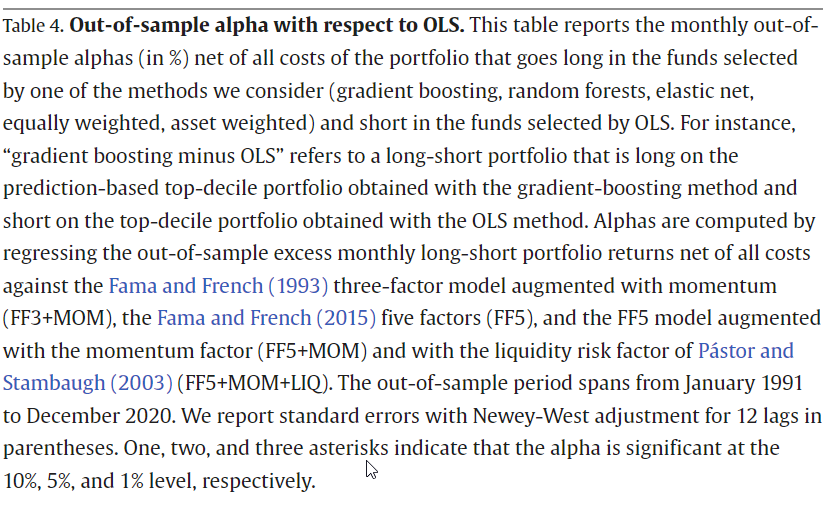The article “Can Machine Learning Help to Select Mutual Funds with Positive Alpha?” first appeared on Alpha Architect blog.
The study emphasizes the importance of integrating machine learning with other tools for investment managers, pension-plan administrators, financial advisors, and independent analysts to help investors select active mutual funds with positive alpha. It also highlights the significance of fund characteristics in predicting alpha, even when portfolio holdings are not disclosed.
Machine learning and fund characteristics help to select mutual funds with positive alpha
- DeMiguel, Victor, Gil-Bazo, Javier, Nogales, Francisco J., and Santos, Andres A.P.
- Journal of Finance 2021
- A version of this paper can be found here
- Want to read our summaries of academic finance papers? Check out our Academic Research Insight category
What are the Research Questions?
The authors ask the following questions:
- Can machine-learning methods be used to predict the performance of active mutual funds, specifically in terms of alpha net of all costs?
- Do these machine-learning methods reveal nonlinearities and interactions in the relationship between fund characteristics and future performance, which traditional linear methods might miss?
- Can the identification of active mutual funds with positive alpha through machine learning be attributed to the detection of managers whose skill is not offset by the disadvantages of managing larger funds?
- How does the performance of machine-learning-based portfolios of mutual funds compare to portfolios constructed using traditional linear methods or naive strategies, such as equally weighted and asset-weighted portfolios?
- Does the performance of these machine-learning portfolios vary over time and across different business-cycle and sentiment regimes?
- What is the economic significance of the positive net alphas generated by the machine-learning portfolios, and how do they compare to the average expense ratios of the funds in the sample?
What are the Academic Insights?
- YES – machine-learning methods, particularly those that consider nonlinear relationships and interactions among fund characteristics, can indeed be employed to predict and construct portfolios of mutual funds with positive alpha after all expenses are considered
- YES – machine-learning methods, particularly gradient boosting, and random forests, can uncover complex and nonlinear relationships among various fund characteristics and performance outcomes. These methods are capable of capturing interactions and patterns that linear methods like Ordinary Least Squares (OLS) may not detect
- YES – machine-learning methods, by considering various fund characteristics, can select portfolios of mutual funds that are not only managed by skilled individuals but also managed in a way that avoids the diminishing returns associated with larger fund sizes. This implies that machine learning helps identify both skilled managers and those managers whose skill remains effective even as the fund grows in size
- Machine-learning-based portfolios, particularly those employing gradient boosting and random forests, consistently outperform portfolios constructed using traditional linear methods like Ordinary Least Squares (OLS)
- NO – machine-learning-based approach remains effective in generating positive alpha across different market conditions and economic cycles, providing consistent results over time
- The study reports statistically significant positive net alphas of 2.36% and 2.69% per year for portfolios constructed using the machine-learning methods of gradient boosting and random forests, respectively. These alphas are substantial and suggest that investors can earn economically significant excess returns by investing in these portfolios. Notably, these positive net alphas are more than double the average expense ratio in the sample, which stands at 1.11%.
Why does this study matter?
This paper matters because it challenges prevailing notions about the performance of active mutual funds, showcases the potential for machine learning to enhance investment outcomes, and offers insights that can inform investment strategies, regulatory decisions, and discussions about market efficiency in the mutual-fund industry.
The Most Important Chart from the Paper:

The results are hypothetical results and are NOT an indicator of future results and do NOT represent returns that any investor actually attained. Indexes are unmanaged and do not reflect management or trading fees, and one cannot invest directly in an index.
Abstract
Machine-learning methods exploit fund characteristics to select tradable long-only portfolios of mutual funds that earn significant out-of-sample annual alphas of 2.4% net of all costs. The methods unveil interactions in the relation between fund characteristics and future performance. For instance, past performance is a particularly strong predictor of future performance for more active funds. Machine learning identifies managers whose skill is not sufficiently offset by diseconomies of scale, consistent with informational frictions preventing investors from identifying the outperforming funds. Our findings demonstrate that investors can benefit from active management, but only if they have access to sophisticated prediction methods.
Join The Conversation
For specific platform feedback and suggestions, please submit it directly to our team using these instructions.
If you have an account-specific question or concern, please reach out to Client Services.
We encourage you to look through our FAQs before posting. Your question may already be covered!
Leave a Reply
Disclosure: Alpha Architect
The views and opinions expressed herein are those of the author and do not necessarily reflect the views of Alpha Architect, its affiliates or its employees. Our full disclosures are available here. Definitions of common statistics used in our analysis are available here (towards the bottom).
This site provides NO information on our value ETFs or our momentum ETFs. Please refer to this site.
Disclosure: Interactive Brokers Third Party
Information posted on IBKR Campus that is provided by third-parties does NOT constitute a recommendation that you should contract for the services of that third party. Third-party participants who contribute to IBKR Campus are independent of Interactive Brokers and Interactive Brokers does not make any representations or warranties concerning the services offered, their past or future performance, or the accuracy of the information provided by the third party. Past performance is no guarantee of future results.
This material is from Alpha Architect and is being posted with its permission. The views expressed in this material are solely those of the author and/or Alpha Architect and Interactive Brokers is not endorsing or recommending any investment or trading discussed in the material. This material is not and should not be construed as an offer to buy or sell any security. It should not be construed as research or investment advice or a recommendation to buy, sell or hold any security or commodity. This material does not and is not intended to take into account the particular financial conditions, investment objectives or requirements of individual customers. Before acting on this material, you should consider whether it is suitable for your particular circumstances and, as necessary, seek professional advice.
Disclosure: Mutual Funds
Mutual Funds are investments that pool the funds of investors to purchase a range of securities to meet specified objectives, such as growth, income or both. Investors are reminded to consider the various objectives, fees, and other risks associated with investing in Mutual Funds. Please read the prospectus accordingly. This communication is not to be construed as a recommendation, solicitation or promotion of any specific fund, or family of funds. Interactive Brokers may receive compensation from fund companies in connection with purchases and holdings of mutual fund shares. Such compensation is paid out of the funds' assets. However, IBKR does not solicit you to invest in specific funds and does not recommend specific funds or any other products to you. For additional information please visit https://www.interactivebrokers.com/en/index.php?f=1563&p=mf















Do you know of any free and sophisticated prediction programs?